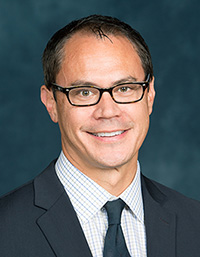March 17, 2020:
Christopher Lao, MD, was recently appointed to represent the University of Michigan Rogel Cancer Center on the Big Ten Cancer Research Consortium Steering Committee. Dr. Lao is clinical professor of internal medicine – hematology/oncology, and medical director of clinical trials for oncology at the University of Michigan.
The Steering Committee is composed of one researcher from each Big Ten CRC member institution and meets on a regular basis to review activities of the consortium and decide matters of policy. The Steering Committee determines the criteria for approving concepts for development with the Big Ten CRC.
“The Big Ten CRC is an opportunity to run multi-institutional trials that are important and practice changing. I look at that as a pretty exciting opportunity,” Dr. Lao said. “Having multiple collaborators involved makes these trials more efficient and provides high-quality data, which will ultimately lead to changing practice and greater support for our patients.”
Dr. Lao’s expertise is in melanoma. Early in his career, he studied melanoma chemoprevention and then transitioned to experimental therapeutics, clinical trials in advanced melanoma, and other cutaneous malignancies, such as Merkel cell and basal cell carcinomas.
His interests are in genetic-based targeted therapies and immunotherapy.
“I would like to think melanoma is the poster child for advancement in treatment and progress toward a cancer cure,” Dr. Lao said. “Both of those approaches – targeted therapies and immunotherapy – have transformed what we do in melanoma, meaning that you see advanced disease anywhere in the body completely disappearing and resulting in long-term remissions and potentially even cures. Not that long ago, the five-year survival for metastatic melanoma was less than 5 percent, and now it’s more than 50 percent.”
Dr. Lao said researchers are making incremental improvements in therapies to improve outcomes but said there is still a lot of work to do.
“Nowadays, we all get together, design trials together, and get them implemented quickly,” Dr. Lao said. “You get broader input on the optimal trial and conduct trials in a more efficient manner, so we can move on to the next question.”
Currently, University of Michigan’s Oncology Clinical Trial Support Unit oversees more than 900 clinical trials with more than 1,400 subjects and more than 90 principal investigators. The university has a growing basic science group in melanoma and one of the largest Merkel cell clinics.
“The melanoma program is one of the largest melanoma programs in the country,” Dr. Lao said. “We have participated in and conducted multiple clinical trials in advanced melanoma, including practice changing trials.”
Dr. Lao has volunteered on several ASCO committees and is currently serving on the Practice Guideline Committee. He also served as co-chair of the Big Ten CRC’s Melanoma/Cutaneous Oncology Clinical Trial Working Group.
Dr. Lao earned his medical degree from Mount Sinai School in New York and a Master of Public Health in epidemiology from Emory University. He completed his residency in internal medicine at the University of Alabama at Birmingham.
About the Big Ten Cancer Research Consortium: The Big Ten Cancer Research Consortium was created in 2013 to transform the conduct of cancer research through collaborative, hypothesis-driven, highly translational oncology trials that leverage the scientific and clinical expertise of Big Ten universities. The goal of the Big Ten Cancer Research Consortium is to create a unique team-research culture to drive science rapidly from ideas to new approaches to cancer treatment. Within this innovative environment, today’s research leaders collaborate with and mentor the research leaders of tomorrow with the unified goal of improving the lives of all patients with cancer.
About the Big Ten Conference: The Big Ten Conference is an association of world-class universities whose member institutions share a common mission of research, graduate, professional and undergraduate teaching and public service. Founded in 1896, the Big Ten has sustained a comprehensive set of shared practices and policies that enforce the priority of academics in the lives of students competing in intercollegiate athletics and emphasize the values of integrity, fairness and competitiveness. The broad-based programs of the 14 Big Ten institutions will provide over $200 million in direct financial support to more than 9,800 students for more than 11,000 participation opportunities on 350 teams in 42 different sports. The Big Ten sponsors 28 official conference sports, 14 for men and 14 for women, including the addition of men’s ice hockey and men’s and women’s lacrosse since 2013. For more information, visit www.bigten.org.

















Subscribe to the Big Ten CRC Newsletter X
X Facebook
Facebook YouTube
YouTube